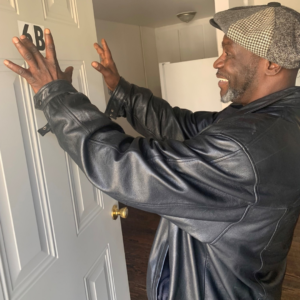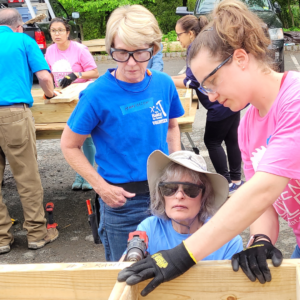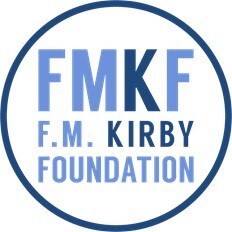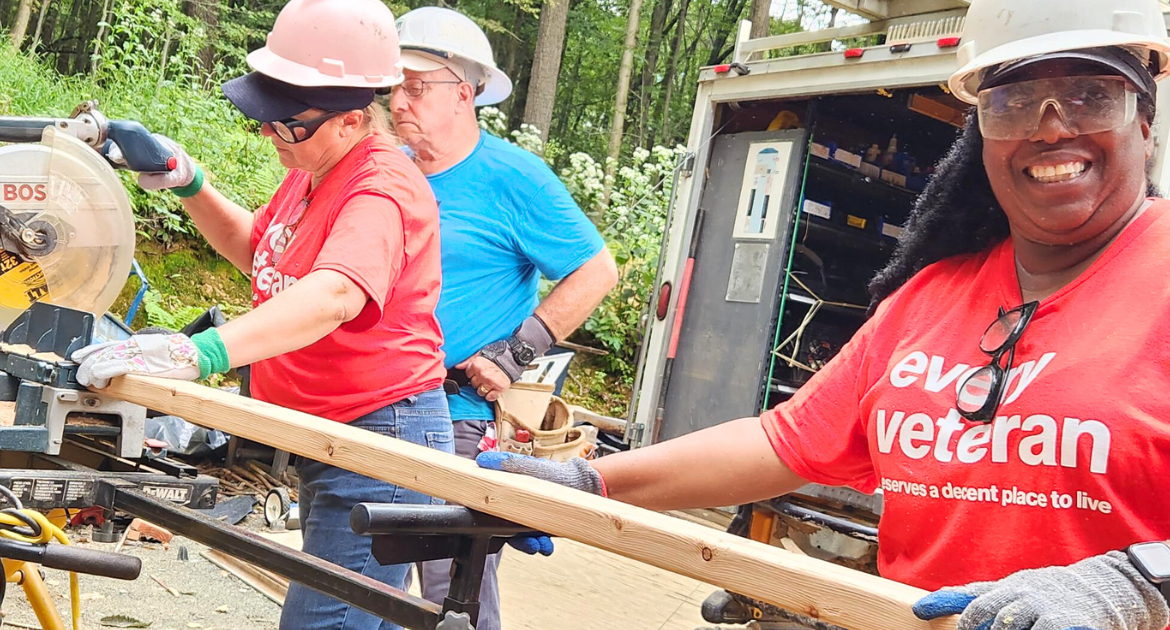By Dave Cucchiara
Communications & Program Associate
Housing insecurity is a growing epidemic across the country, affecting millions of Americans who struggle to maintain safe, consistent, affordable housing. Key issues contributing to this crisis include rising rent costs, stagnant wages, a decline in inventory, and a lack of affordable housing options, particularly in urban areas. This often leads to frequent relocations, overcrowded living conditions, and increased vulnerability to homelessness. On the national stage, legislators continue to advocate for affordable housing initiatives, increased rental assistance programs, and policies that protect tenants from eviction, such as rent control and housing subsidies. However, the role community-based nonprofits play in working to provide emergency shelter, transitional housing, and supportive services is critical to making sure families get what they need to find a permanent solution.
In North Carolina, one F. M. Kirby Foundation partner has been helping their vulnerable neighbors secure safe and affordable housing since 1992. With a mission to end homelessness, one person at a time, Housing for New Hope began by providing transitional shelters for men and has since grown into a multidimensional resource, focusing on street outreach, supportive housing, and affordable housing solutions.
“I’ve got a home. Housing for New Hope did that,” said Parks, a recent Housing for New Hope program participant. “And if you get a chance, get people off the streets. Give them a home. And give them love. Let them know they’re not wasted people.” 
In recent years, Housing for New Hope has expanded its programming in response to evolving community needs around homelessness and housing. Through partnerships with local government and nonprofits, they encourage, motivate, and enable individuals and families experiencing homelessness to take their next best step toward long-term, stable housing. The Street Outreach team leads Durham’s efforts to connect with the unsheltered population by active, daily engagement on behalf of the city and county. The Supportive Housing Team provides life skills training, access to mental health, substance use disorder resources, and more, ensuring that those they serve have the tools needed for sustained success. Housing for New Hope continues to be a critical player in the city’s efforts to combat homelessness, considering both immediate relief and long-term solutions.
In New Jersey, another partner organization is taking a like-minded approach to helping military families navigate the challenges of securing stable housing once their service is up. Community Hope was founded in 1985 to provide “a beacon of hope in our community, connecting individuals and families with life-changing support, services, and housing that foster the independence and resiliency to live their best lives.” Initially established as a transitional housing program for individuals struggling with mental illness, the organization has evolved to address the diverse needs of its community, particularly focusing on veterans and their families. Through the years, Community Hope has expanded its services to include a range of supportive programs that promote stability, recovery, and independence.
“Since our organization began in 1985, we have taken pride in helping some of the most at-risk and marginalized members of New Jersey communities,” said Carmine Deo, Chief Executive Officer of Community Hope. “We continue to be a presence in the communities we serve, providing individuals in need with housing and with services to lift them above their conditions of mental illness, addiction, poverty, and homelessness.”
Community Hope offers permanent supportive housing and transitional housing for individuals with mental health diagnoses, as well as a comprehensive veterans’ services program. In fiscal year 2023, the staff served more than 1,400 individuals and their families, nearly triple the number they assisted just 5 years ago. Recent initiatives have emphasized comprehensive mental health support and the importance of holistic care, incorporating counseling services and life skills training into their programming. By fostering a holistic approach, Community Hope not only assists individuals in securing housing, but also empowers them with the tools necessary for long-term success and well-being.
Housing insecurity is best addressed through broad, community-driven efforts that extend beyond simply providing a place to live. These programs create a sense of ownership and responsibility, empowering individuals and families to achieve long-term stability. For families seeking a consistent, affordable place to call home during a time when housing is limited, another F. M. Kirby Foundation partner is building a pathway to a brighter future.
 Since 1985, Greater Middlesex & Morris Habitat for Humanity (formerly Morris Habitat for Humanity) has been on the ground floor of addressing localized housing insecurity. With a mission to provide affordable homes to families in need, the organization remains part of the greater Habitat for Humanity network and is the sole developer of homeownership opportunities for low- and middle-income families across the county. Over the decades, Greater Middlesex & Morris Habitat has built and rehabilitated hundreds of homes, empowering more than 1,000 families to achieve stable, reliable, and affordable housing. Homeowners who benefit through the program then contribute their time for future projects alongside volunteers, creating a sense of community. As one of the most active volunteer programs in North-Central New Jersey, Greater Middlesex & Morris Habitat draws 115,000 visits from volunteers each year!
Since 1985, Greater Middlesex & Morris Habitat for Humanity (formerly Morris Habitat for Humanity) has been on the ground floor of addressing localized housing insecurity. With a mission to provide affordable homes to families in need, the organization remains part of the greater Habitat for Humanity network and is the sole developer of homeownership opportunities for low- and middle-income families across the county. Over the decades, Greater Middlesex & Morris Habitat has built and rehabilitated hundreds of homes, empowering more than 1,000 families to achieve stable, reliable, and affordable housing. Homeowners who benefit through the program then contribute their time for future projects alongside volunteers, creating a sense of community. As one of the most active volunteer programs in North-Central New Jersey, Greater Middlesex & Morris Habitat draws 115,000 visits from volunteers each year!
“We are proud of the work we have done for nearly 40 years in and around Morris County,” said Liz DeCoursey, Chief Executive Officer of Greater Middlesex & Morris Habitat. “Our work is strengthened through our collaborations, partnerships and our volunteer program — we bring people together, which is core to our mission. But the need is greater now more than ever. We have committed to serve at least 500 families over the three-year period, 2024 – 2026, to elevate the quality of life for the families and communities we serve.”
In recent years, Greater Middlesex & Morris Habitat has expanded its reach and impact through a variety of initiatives. Its Neighborhood Revitalization Program completes home repairs and helps seniors and low-income homeowners remain in their homes safely and comfortably. By revitalizing neighborhoods and addressing the unique needs of low income and elderly homeowners, Greater Middlesex & Morris Habitat strengthens communities and improves the overall quality of life for residents. Additionally, they operate the Morris Habitat for Humanity ReStore, where donated home goods are sold and all proceeds support Greater Middlesex & Morris Habitat’s homeownership and home repair programs. Through these initiatives, the organization continues to build stronger communities and provide sustainable housing solutions for families in need.
Maya Angelou once said, “The ache for home lives in all of us, the safe place where we can go as we are and not be questioned.” Chronic homelessness is at an all-time high in the United States, making the work of these pioneering organizations even more essential by ensuring families have a roof over their heads. Roughly half of individuals experiencing homelessness are employed, highlighting that the issue lies in housing accessibility, not a lack of effort or hard work. Organizations like Housing for New Hope, Greater Middlesex & Morris Habitat for Humanity, and Community Hope are catalysts in helping thousands of American families overcome obstacles and find a place to call home.



